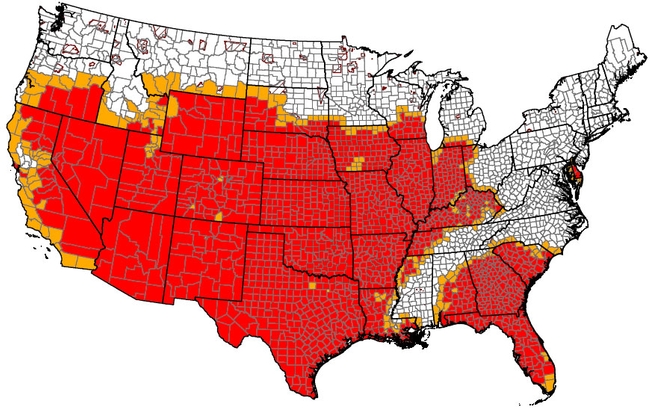Posts Tagged: drought
Some farmers won't suffer due to drought
National Public Radio's Planet Money pointed out that many U.S. farmers who are losing their crops due to drought won't suffer financially because they have government-subsidized crop insurance.
U.S. taxpayers spend about $7 billion a year on crop insurance, the story said.
Daniel Sumner, director of the UC Agricultural Issues Center and professor in the Department of Agriculture and Resource Economics at UC Davis, said he isn't in favor of the government giving farmers subsidies.
Ski resorts suffered last winter when there wasn't a lot of snow. The government doesn't say, "Sorry you didn't have a lot of skiers. Here's a check," Sumner said.
Valley farmers wary of new water rules
Mark Grossi, The Fresno Bee
A UC study released in March says 96 percent of the Central Valley's groundwater contamination problem comes from agriculture, and it threatens the drinking water of 250,000 valley residents. The study suggests better monitoring and management of fertilizers are needed to ease the problem. By using only the amount of fertilizer needed by plants, the nitrates would be controlled. Leaders of water-user groups say farmers already aim for that goal and have become far more efficient. Yet, the state assumes all farmers are discharging to the groundwater, said David Orth, general manager of the Kings River Conservation District and coordinator of a coalition representing farmers in the four-county area. "In other words, everybody is guilty until they prove themselves to be innocent," he said.
Experts: Rinds one reason for salmonella-infected cantaloupe
Scott Kanowsky, WBEZ 91.5
Cantaloupe rinds could be one reason behind a recent salmonella outbreak linked to the fruit. "It's much easier to scrub the surface of a honeydew melon than it is to scrub the surface of a cantaloupe and actually remove microorganisms that are on the surface,” said Linda Harris, UC Cooperative Extension specialist in the Department of Food Science and Technology at UC Davis.
Corn should be for food, not fuel, two experts say
A sweeping drought in the Midwest has pushed up corn commodity prices and prompted a UC agricultural economist and his colleague to call for federal authorities to suspend renewable-fuel standards that require the blending of 13.2 billion gallons of corn ethanol with gasoline this year
In an op-ed published in the New York Times, Colin Carter, a professor in the Department of Agricultural and Resource Economics at UC Davis, and Henry Miller, a physician and a fellow in scientific philosophy and public policy at the Hoover Institution, said the U.S. Environmental Protection Agency could divert vast amounts of corn from inefficient ethanol production back into the food chain.
"The price of corn is a critical variable in the world food equation, and food markets are on edge because American corn supplies are plummeting," they wrote. "The combination of the drought and American ethanol policy will lead in many parts of the world to widespread inflation, more hunger, less food security, slower economic growth and political instability, especially in poor countries."
Carter also spoke about the issue on the Capital Public Radio program Insight. He said the rising corn prices will likely have the biggest impact in California on feed lot operators who feed corn and soybean meal to cattle. Dairies will also be hit very hard.
Feeling the economic pain of drought
Reduced water allowances for farmers could mean layoffs and other economic impacts, says an article in the Wall Street Journal by Jim Carlton.
The article reported that some farmers have been told to expect just 30 percent of their allotments. In response to water cutbacks, many farmers must reduce planting and leave some fields fallow.
The article referenced a UC Davis study, co-authored by Richard Howitt, of 2009 water cutbacks that resulted in "285,000 acres going fallow and the loss of 9,800 agricultural jobs, for a $340 million loss in farm-related revenues."
California's rain is locked up in Alaska snow
Precipitation that would normally head toward California along the Pacific jet stream has for weeks veered north, burying Alaska in record snow, said an article by San Jose Mercury News reporter Lisa Kreiger. The story appeared yesterday in the Contra Costa Times.
The weather trend has left California drenched in sun this winter, but for many, sunny skies have worn out their welcome.
In the Central Valley, stock ponds are running dry -- and cows drink 10 to 15 gallons a day. Some ranchers are considering trucking in water or culling their herds, said Yuba City-based UC Cooperative Extension farm advisor Glenn Nadar. He predicts a surge in milk and beef prices.
Orchardists worry about their almond trees, whose buds are swelling -- but roots are dry. Winter wheat is also parched. To help, some water districts are diverting water into their canals.
"We're irrigating, which is unheard of," said farm advisor Franz Niederholzer, with UC's Cooperative Extension in Sutter and Yuba counties.

California ranchers may need to truck in water for their cattle.
Winter warmth and wildfires reported in Nevada
In contrast to typical winter weather patterns, in 2012 Nevada has experienced some early January days that were downright hot, wrote Dennis Myers in the Reno News and Review. Wildfires, normally a feature of summer and fall, have been experienced during this winter.
The article said Nevada's cloud seeding program is prepared for any break in the weather pattern that will provide storms that can be seeded. Truckee Meadows is dependent on the snowpack for its water supply and a lack of snow threatens the tourist economy. Nevada’s farming areas have a stake in the cloud seeding program and forest recovery after wildfire also relies on winter rain.
After the 2007 Angora Wildfire, for instance, the effectiveness of reseeding was undercut by the dry winter. According to Susan Kocher of the University of California Cooperative Extension, “that very dry winter did reduce the survival rate of newly planted tree seedlings. … The later in the spring season they were planted, the worse the survival was as the drought just kept getting worse.”
Kocher said the California Tahoe Conservancy had to keep planting and replanting in 2008, 2009, and again in 2010 before it started having success in getting the number of trees up to pre-fire levels.

Dry winter weather inhibited forest recovery after the 2007 Angora Wildfire near Lake Tahoe.



